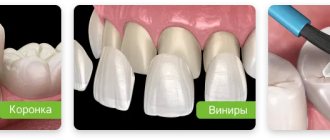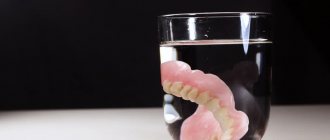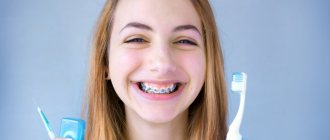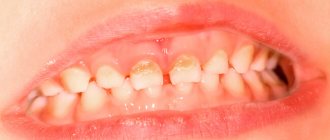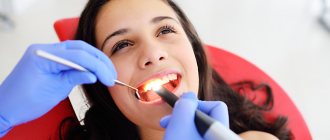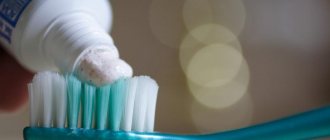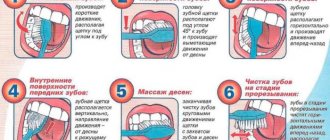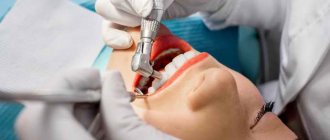If you neglect to brush your teeth, they will eventually deteriorate. Dentists assure that it is necessary to regularly clean the oral cavity by brushing and flossing using mouthwash and toothpaste.
If you do not regularly maintain oral hygiene, then even tissue such as tooth enamel, the most durable of the tissues of the human body, begins to deteriorate under the influence of acid. And not at all from sour foods! Food grade acids like acetic and citric acids are not harmful to teeth. But such as formic and propionic acid, which are produced by bacteria that live in the mouth, can seriously harm the teeth. Bacteria trigger fermentation processes, during which these harmful acids appear. Sweets also help activate these processes.
So a person who does not brush their teeth regularly has more than just plaque containing bacteria. The consequences can be much more serious:
- There is an unpleasant odor from the mouth. Any person feels uncomfortable if he has not brushed his teeth; he thinks his breath smells bad. Especially if the teeth have not been brushed for a long time, the smell becomes putrid and becomes a clear manifestation of disrespect for others. No wonder the famous advertisement comments that fresh breath ensures mutual understanding.
- Tartar begins to form from plaque on the teeth. It only seems harmless, but gradually destroys tooth enamel. Stone can only be removed by a dentist.
- Caries develops, dental tissues begin to deteriorate, and they are affected by microflora with the same bacteria. Well, advanced caries is the path to pulpitis and tooth extraction.
- If inflammation from unbrushed teeth spreads to the surrounding tissues, periodontal disease occurs, in which the gums bleed, the mouth smells bad, pus is released, the teeth become loose and fall out. This disease can only be treated surgically.
Why is oral hygiene necessary and is it possible not to brush your teeth at all?
Enamel is the strongest tissue in the human body, but at the same time it is susceptible to aggressive acid attack and is also quickly destroyed under the influence of pathogenic microorganisms. Their active activity leads to the formation of abundant bacterial plaque. If it is not systematically removed, it will transform into hard stone and provoke the development of carious processes.
If you completely refuse to clean, plaque will begin to accumulate not only on the enamel, but also in the subgingival area, as well as on the surface of the mucous membrane and tongue. The photo below shows what a smile looks like without proper hygiene.
The photo shows inflammation and stone on the teeth
Obviously, under such circumstances nothing good can be expected. If you refuse daily cleaning, only negative changes will occur:
- a dense yellow coating will appear - food debris will gradually begin to rot and provoke the active proliferation of bacteria. At the initial stage, they can be easily removed with a brush and paste, but soon they will appear again, and this is a completely natural process. That is why hygiene should not only be of high quality, but also regular. But if your teeth remain dirty for a long time, this will create ideal conditions for the rapid proliferation of bacteria, and very soon the soft plaque will begin to harden,
- a stone will form - without regular cleaning, the soft bacterial layer will begin to harden and grow, like limescale. This is how a solid stone appears. Gradually, deposits will descend along the gums, leading to the formation of periodontal pockets. It is no longer possible to remove the stone with a simple brush, so professional cleaning using ultrasound, laser, Air-Flow device and mechanical treatment will be required.
- the inflammatory process will begin - if hard deposits are left unattended, they will begin to irritate the mucous membrane and easily provoke an inflammatory process. In this case, literally within a week from the moment you refuse to brush, the enamel will turn yellow, and the gums will turn red and inflamed, begin to hurt and bleed. Often all these symptoms are aggravated by purulent processes.
The answer to the question of whether it is possible not to brush your teeth will be categorical - you cannot ignore oral hygiene, otherwise you may face very serious consequences. One of these common problems is tooth decay, but it doesn’t end there. Sometimes dental diseases become the source of other pathological processes that affect the health of not only the oral cavity, but also the body as a whole.
Why do we need tongue scrapers, interdental brushes, dental floss and everything else?
A tongue scraper is very important because the tongue needs to be cleaned too. You can do this with a separate brush, but a scraper is much more convenient and effective. I recommend double scrapers, here are a couple of examples: Curaprox double and TePe. It is better to use the scraper before the main cleaning, passing over the tongue literally three to four times.
Dental floss is not recommended at this time. More precisely, it is very good for cleaning fiber from meat after a restaurant (and better than not having it at all), but it is bad if you do not know how to use it correctly. But almost no one knows how: you can’t touch your gums with it. Therefore, a more modern approach is interdental brushes. They look like this:
As you can see, they are different colors for different intervals. They need to be selected with a doctor using a special probe, which is inserted between specific pairs of teeth. It’s better not to do this on your own. To summarize: it is better to forget about brushes, as well as about thread, until your doctor directly advises you to do so.
Mouthwash is good during the day after meals, as long as it does not contain alcohol. It works better with alcohol, but damages teeth and soft tissues (primarily mucous membranes). Without alcohol it is worse and is not suitable as a replacement for a full-fledged cleaning, that is, it is better to use it only during the day if you need to get rid of odor or clean your mouth after eating.
There are also foams like Water Dent - they restore the environment to a slightly alkaline environment, which is much better than the acidic environment after a meal (and especially after coffee). Some mouthwashes work the same way.
What could be the consequences if you refuse to cleanse?
If a person ignores the basic rules of care for a long time, he soon risks facing a whole bunch of serious problems. Possible scenarios are discussed in detail below.
Unpleasant odor - halitosis
Abundant plaque and subgingival deposits create a favorable environment for the further proliferation of bacteria and the spread of pathogenic microflora. A natural consequence of this process is the appearance of bad breath. In medical terminology, this symptom has its own definition - halitosis.
If oral hygiene is not maintained, an unpleasant odor appears
Its development is also facilitated by tiny particles of food that settle on the tongue and get stuck in hard-to-reach places. If they are not cleaned off in time, they will begin to rot and decompose, which will also inevitably affect the freshness of your breath. Halitosis is not only a harbinger of pathological processes, but also a source of psychological complexes, a cause of decreased quality of life and deterioration of relationships with others.
Stains on enamel
Many foods and drinks contain intense coloring pigments. These include tea and coffee, sweet carbonated water with flavors and dyes, wine, berries, desserts and much more. If you don't brush your teeth twice a day, all those treats can cause age spots to appear on your enamel. This also includes smoking - constant exposure to nicotine tar inevitably provokes yellowing.
Plaque appears on teeth
Destruction of the enamel layer
Enamel is a kind of protective shell for dentin; it prevents aggressive influence from the outside. It is worth noting here that the temperature in the oral cavity is quite high, and this is an ideal environment for the decomposition of food debris, which serves as a source of nutrition for pathogenic microorganisms. As a result, the enamel becomes covered with plaque, consisting mainly of bacteria and their metabolic products. The enzymes and acids they secrete gradually destroy hard tissues, which leads to their rotting and the development of caries - read more about this problem further.
Carious processes and pulpitis
Caries begins with the “white spot” stage - a subtle strip of light or grayish color appears on the enamel. Gradually it grows, darkens, destroys enamel and reaches dentin - all this is a consequence of bacterial activity. As a result, a large hole appears - a carious cavity. Along with it, discomfort and pain arise, especially at the time of mechanical, acid or temperature exposure.
If you continue to ignore the symptoms, drowning out the unpleasant sensations with painkillers, advanced caries will lead to the development of pulpitis - inflammation of the pulp, that is, the nerve. At a late stage, this disease leads to the need for complete removal of the neurovascular bundle. The tooth is deprived of “feeding” and from that moment is considered dead, becomes more fragile and darkens.
Caries and pulpitis may appear
Tissues affected by caries are a breeding ground for infections. Microbes from the oral cavity can lead to the development of diseases of the gastrointestinal tract, since they easily penetrate there along with saliva. But through the bloodstream they can reach the heart, and the consequences of this will be very serious. To prevent such a development of events, it is enough to maintain hygiene: brush your teeth twice a day, and also regularly visit the dentist for preventive and professional care. cleaning.
Periodontitis and bone destruction
Periodontitis is an inflammation of the tissues surrounding the root. Infection through the carious cavity through the root canals penetrates to the base of the root system, provokes tissue inflammation and even suppuration. As a result, a painful, inflamed lump may appear on the gum, and this requires urgent medical attention. The neoplasm must be opened and cleaned of purulent exudate. You also have to clean and seal the canals. But the reason is still the same - plaque, deposits, caries, etc.
The photo shows purulent inflammation
The bacteria release enzymes that can begin to break down surrounding bone tissue. An advanced form of periodontitis often leads to the need to remove the causative tooth, and sometimes even requires osteoplastic surgery.
Gingivitis – inflammation of the gums
Gingivitis is the initial stage of inflammation of the gums, that is, the surface tissues. Such a nuisance often occurs against the backdrop of poor hygiene, when heavy plaque begins to harden and turn into stone. Deposits injure the gums, causing inflammation and bleeding. Gum pockets gradually form, in which food debris and pathogenic bacteria also accumulate. All this leads to the appearance of an unpleasant odor and the further development of periodontitis.
The photo shows gingivitis
Periodontitis and periodontal disease
Periodontitis is one of the most common causes of early tooth loss. We are talking about a pathological condition that is characterized by inflammation of periodontal tissue, that is, the deeper layer of the gum mucosa. This disease causes redness, inflammation and swelling of the soft tissues, causing them to bleed and be painful. But the pathological process also disrupts the dentogingival ligamentous apparatus, which leads to pathological mobility and adentia.
Unfortunately, periodontitis is considered an incurable disease. However, with the help of modern methods of therapy, stable remission can be achieved. It is required to regularly undergo prof. cleaning in the dentist's office, the procedure of closed or open curing of the gums, giving blood plasma injections, using special medications. It is also important to ensure increased attention to oral care. With a severe aggressive course of the pathology, there is a risk of developing periodontal disease, that is, not inflammatory, but degenerative damage to periodontal tissue, and this further accelerates the process of loosening and tooth loss.
Periodontitis and periodontal disease occur
Diabetes and kidney problems
Often, patients with diabetes have high blood sugar levels (up to 12 mmol) for a long time. There are proven cases where, after the removal of diseased teeth in patients with diabetes and periodontitis, the sugar level decreased to 7-8 mmol. Thus, inflammation of periodontal tissue aggravates the course of diabetes mellitus and vice versa - a vicious circle is obtained.
In addition, this inflammatory disease significantly increases the risk of developing pyelonephritis (kidney inflammation) - almost 6 times. In this case, pathogenic microorganisms from the periodontium enter the body along with the bloodstream, and there they produce proteins that are similar in structure to kidney cells. When immune defense is activated, not only pathogens are destroyed, but also healthy cells of vital organs. Other possible consequences include glomerulonephritis and chronic renal failure.
Cardiovascular diseases and stroke risk
According to the results of studies, there is a direct relationship between chronic gum pathologies and diseases of the cardiovascular system. So, for example, with diagnoses such as periodontal disease or periodontitis, the risk of having a stroke increases by as much as 20%1.
It turns out that failure to follow basic oral care rules significantly increases the likelihood of a heart attack. This is partly because bacteria “walking” through the bloodstream settles on the walls of the arteries, and if they lead to the heart, the organ does not receive enough oxygen. Its cells begin to die, which provokes the development of pathological conditions. Therefore, with insufficient oral hygiene, even slight trauma to the mucous membrane can provoke the development of a serious disease.
Increased risk of stroke
Causes of tooth decay. How to stop him?
To provide adequate treatment, the doctor must first determine the cause of the disease. Otherwise, the measures may turn out to be useless, the process will continue to develop. The causes of tooth decay are external and internal factors. Despite the fact that enamel is considered one of the most durable materials in the body, under unfavorable conditions it quickly deteriorates. As a result, microbes gain unhindered access to the inner, less protected part of the tooth.
To cope with this problem at the initial stage, one visit to the dentist is usually enough. He clears the cavity of affected tissue and closes it with a filling. However, simple neglect of their health and fear of the dental office make people postpone the visit. The result is deterioration of the teeth and their loss.
Does everyone suffer without regular cleaning?
Of course, not everyone who does not carefully monitor the cleanliness of their oral cavity will necessarily encounter the problems listed above. But it's only a matter of time. Some people have excellent health, strong immunity, and high resistance to viral and infectious attacks. They can not maintain proper hygiene and still remain perfectly healthy for many years.
“My sister had a real problem with her teeth. I don’t know why, but they were very susceptible to caries. I went to the dentist at most once a year, but she went there every month, if not more often! It’s true, you don’t clean it once before going to bed and everything immediately starts to hurt, sensitivity appears. Even now she has so many different gadgets for hygiene, but problems still often arise. And you can’t blame it on genetics, everything’s fine with me...”
Sofia_Art., from correspondence on the woman.ru forum
Most often, such “luck” is explained by favorable hereditary factors, high calcium content in hard tissues, the composition of salivary fluid and other individual characteristics of the body. But this does not mean that you do not need to brush your teeth. Sooner or later, dental problems will still make themselves felt - for some later, for others earlier. For some, the situation is completely opposite - an increased tendency to destroy enamel and develop caries. Relying on genetics is stupid and reckless, so it’s better to maintain hygiene and take care of your health, especially since today this is not at all difficult.
Brushing your teeth is essential for staying healthy.
Is it possible to independently assess areas of biological damage?
Yes, you can. To do this, you need to buy either Curaprox, Dynal tablets, or Curaprox, PresiDENT liquid at your nearest pharmacy. The tablets are chewed to a cheerful foam and spat out. Considering that you need to carefully and thoughtfully read the instructions to the end, it is better to buy a liquid; it is applied with a special swab or cotton swab. It will be more reliable. But if you have not had hygiene for the last two to three months, then it is better to do it on Friday evening. In fact, it washes off almost immediately, but there is a chance that particularly severe lesions will be stained for about 50 hours. This happens quite rarely and with poor hygiene, but it is a matter of chance.
How in ancient times our ancestors managed without regular cleaning
Before the advent of cleansers, pastes, balms and rinses, people did not care too much about the condition and appearance of their smile. To remove plaque, our ancestors used dried herbs mixed with chalk and charcoal. For rinsing, decoctions of chamomile, oak bark and propolis tincture were prepared. For fresh breath, they chewed tree resin and mint leaves.
A clear example of what happens if plaque is not cleared for years was demonstrated by the Chinese Emperor Mao Tse Tung. His decision to abandon hygiene entirely was based on observations of wild animals. The leader thought that if their fangs did not suffer in any way without cleaning, then people did not need it either. But over time, his smile noticeably turned yellow, a foul odor appeared, and his incisors and molars began to rot and fall out. No one from the inner circle dared to reprimand their leader.
Chinese Emperor Mao Zedong Never Brushed His Teeth
We need to understand that our diet is very different from the food that animals are used to. Now we have at our disposal a lot of tasty, but often harmful dishes, with chemical additives, dyes and carcinogens. Many smoke, drink coffee and strong teas. All this has direct consequences for the appearance and health of the enamel. I don’t want to brush my teeth, because animals don’t brush them – in our modern world this is not an argument. If you want to keep your smile beautiful and healthy, you will have to maintain hygiene.
Does the irrigator work?
A toothbrush removes about 70% of biofoci. The rest are located where mechanically cannot be reached, for example, at contact points. So yes, the irrigator complements regular teeth cleaning very well. If you can, use it every time. But just don’t take stationary ones that require connection to a household power supply. Practice shows that my patients do not use these because of the difficulty of turning them on in the bathroom. It’s better to use mobile phones with batteries, they are much simpler and always at hand near the sink.
What happens if you don't brush your teeth in the evening?
If you forget about the brush and paste once before going to bed, nothing catastrophic, of course, will happen. However, the condition of hard tissues may worsen. While we sleep, all processes in our body slow down. Saliva becomes more viscous and does not wash the surfaces in the mouth better. At the same time, pathogenic microorganisms are activated, which leads to the formation of plaque and an unpleasant odor. If you missed the procedure once, don’t worry. But in the morning, do not forget to remove plaque from the enamel and tongue with a brush and paste. It is also advisable to rinse your mouth with a prophylactic solution.
If you skip brushing your teeth in the evening, plaque will form in the morning
Is it true that you should throw away the brush when at least one lint deviates from the vertical?
Yes, if the bristles on your brush are no longer vertical, it is better to change it.
Typically, brushes are changed about once a month, but high-quality options from the recommendations above can be changed once every three months with the right manual skills. It is also very important to change your brush after hygiene at the dentist: they “restart” the microbiota of your oral cavity, and it is not very good to introduce old pathogenic ones from an old brush.
Pharmacies sell disposable toothbrushes with dry granules and beneficial enzymes. I recommend keeping one in your bag; it's a great option if you find yourself wanting to look and smell perfect.
Basic rules for maintaining hygiene - expert advice
To maintain oral hygiene, it is enough to follow simple basic rules. Here's what dental and hygiene experts recommend in this regard:
- Cleaning twice a day is the first and main rule. Moreover, you should use an individually selected brush and paste, and in this regard it is better to consult your dentist personally,
- use floss and rinse your mouth every time after eating - to quickly remove food debris,
- limit your consumption of sweets, especially before bed - sugar and simple carbohydrates pose an increased risk to enamel health,
- clean your tongue - it is on its surface that the most bacteria are concentrated, which become a source of unpleasant odor. To remove plaque from the tongue, you can use the reverse ribbed surface of the brush or a special scraper.
Proper oral hygiene will help maintain healthy teeth for a long time.
It is also important to visit the dentist’s office at least twice a year - for preventive maintenance and professional procedures. hygiene. Even with regular quality care, bacteria remain in the mouth and lead to the formation of deposits. Only a doctor can remove them, using hand tools, ultrasound, laser or sandblasting. Following all of the above recommendations will help you maintain a beautiful smile for many years.
1Grudyanov A.I., Ovchinnikova V.V. Inflammatory periodontal diseases as a risk factor for the development of pathology of the cardiovascular system, 2007.

